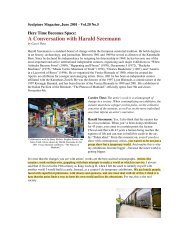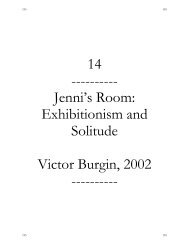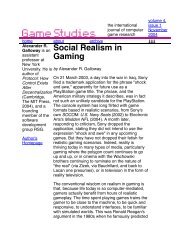Untitled
Untitled
Untitled
Create successful ePaper yourself
Turn your PDF publications into a flip-book with our unique Google optimized e-Paper software.
Europe and Its Others<br />
something as a work of art are partial, but their overall rhetoric is unmistakably<br />
European.<br />
This rhetoric, as we well know, was repeatedly applied to the area of<br />
the human as well. From Flaubert, Baudelaire, and Dostoyevsky, by way of<br />
Kierkegaard and Nietzsche, to Bataille, Foucault, and Deleuze, European<br />
thought has acknowledged as a manifestation of the human much of what<br />
was previously considered evil, cruel, and inhuman. Just as in the case of art,<br />
these authors and many others have accepted as human not only that which<br />
reveals itself as human but also that which reveals itself as inhuman—and<br />
precisely because it reveals itself as inhuman. The point for them was not to<br />
incorporate, integrate, or assimilate the alien into their own world but, conversely,<br />
to enter into the alien and become alien to their own tradition. That<br />
these authors, like countless others in the European tradition, cannot easily<br />
be integrated into the discourse on human rights and democracy, need not,<br />
in my opinion, be demonstrated here. Nevertheless, these authors, perhaps<br />
like no others, belong for just that reason to the European tradition, because<br />
they manifest an inner solidarity with the other, with the alien, even with the<br />
threatening and cruel, that lies much deeper and takes us much farther than<br />
a simple concept of tolerance. The work of all these authors is an attempt to<br />
diagnose within European culture itself the forces, impulses, and forms of<br />
desire that are otherwise territorialized in foreign lands. Hence these authors<br />
have shown that the truly unique feature of European cultures consists in<br />
permanently making oneself alien, in negating, abandoning, and denying<br />
oneself—and doing so in a way more radical than that of any culture we know<br />
has ever been able to do. Indeed, the history of Europe is nothing other<br />
than the history of cultural ruptures, a repeated rejection of one’s own<br />
traditions.<br />
This certainly does not mean that the discourse on human rights and<br />
democracy is inherently deficient or that it should not be entered into. It<br />
merely means that this discourse should not serve the goal of differentiating<br />
European culture from other cultures, as, unfortunately, happens more and<br />
more frequently today. The others, the aliens are correspondingly identified<br />
primarily as those who necessarily lack respect for human rights and the<br />
capability for democracy and tolerance if only because these values are considered<br />
specifically European by definition. Thus these aliens, as soon as they<br />
arrive in Europe, are sent down the infinite path to so-called integration,







